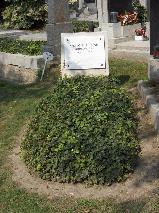Odilon, Helene |
| ACTOR (GERMANY) |
|
BORN 31 Jul 1865, Dresden, Sachsen - DIED 9 Feb 1939, Baden, Niederösterreich (near Wien): Haus Sorgenfrei BIRTH NAME Petermann, Helene GRAVE LOCATION Wien: Zentralfriedhof, Simmeringer Hauptstraße 234, Simmering (Gruppe 12 D, Reihe 01, Nummer 23) |
|
Helene Odilon started as an actress in Chemnitz, but she was contracted by the Court Theatre in Berlin according to the wishes of emperor Wilhelm I. In 1891 she left for Vienna, where she was soon famous for her wild private life and her erotic radiation. She seemed to have bewitched the town, at least the male part of it. Odilon worked for the Deutsches Volkstheater where she starred as Madame Dubarry and Madame Sans-Gêne. In 1898 Hermann Bahr wrote the part of Lona Ladinser for her in "Der Star". She also performed successfully in London and in the United States (1902). In 1893 she married the popular actor Girardi but the marriage was a complete disaster. Odilon continued her numerous love affairs and Girardi became extremely jealous. At home Girardi made her listen for hours to parts of his operettas and then refused to listen to her when she was learning a new part. At one time Odilon moved over to the Sacher hotel and tried to get rid of Girardi by getting him committed to a clinic. The famous psychiatrist Dr. Julius Wagner-Jauregg stated without seeing Girardi in person that he was dangerous because of his use of cocain and should be committed to the mental home Svetlin. But Girardi managed to get away just in time. In 1896 the marriage was formally over. Her second husband was Ferencz von Rakovsky, a Hungarian who soon bored her. She twice went to the USA where she acted at Irving Place, the second time together with the actor Sonnenthal, with whom she subsequently toured the country. She observed that Chicago smelled of pigs. In 1903 she suffered a stroke when she was in Tyrol. It ended her career abruptly. The right side of her body was lame now and she was even put under supervision. Rekovsky died in 1907 and in that same year she married her third husband, the apothecarian Bela von Pecic from Zagreb. As a proof that she hadn't lost her mind she named her memoirs "Das Buch einer Schwachsinnigen" ("The Book of a feeble-minded", 1909). In this book she recalls how she and Girardi went to Scheveningen. Girardi was in a bad mood and did nothing but complain. At a certain point she could stand it no more and sent a telegram to a casual acquaintance that she didn't particularly like: "Come here at once and elope with me!". She and Girardi soon became friends again and she was lucky that the acquaintance never showed up. It was doubted in Austria if her third marriage, by which she obtained the Hungarian nationality, was legal and the discussion about her being under supervision continued until 1910. After that the public lost interest in her case and she disappered from the public eye. In 1920 she lived in a retirement home in Salzburg. Hermann Bahr visited her and wondered in his newspaper column if the Deutches Volkstheater in Vienna remembered her, after it had lived for a decade from her performances. From Salzburg she returned to her native Dresden, where she lived in the Christlichen Hospitz in 1925. In 1925 the press wrote that she was blinded (since 1916) and impoverished and that she was forced to beg. In 1928 she received a small pension and she received a place in the retirement home Sorgenfrei in Baden near Vienna. There she was visited several times by Adele Sandrock. She died in 1939 in Baden. Family • Husband: Girardi, Alexander (1893-1896) Related persons • was painted by Adams, John Quincy • knew Bahr, Hermann • was visited by Sandrock, Adele • was sculpted by Tilgner, Viktor |
| Images |
Sources • Budig, Robert S. et al, Ehrengräber am Wiener Zentralfriedhof, Compress Verlag Wien, Wien • Katharina Schratt, Die Heimliche Frau des Kaisers, Ullstein, Berlin, 1988 • Odilon, Helene eigentlich H. Petermann |




